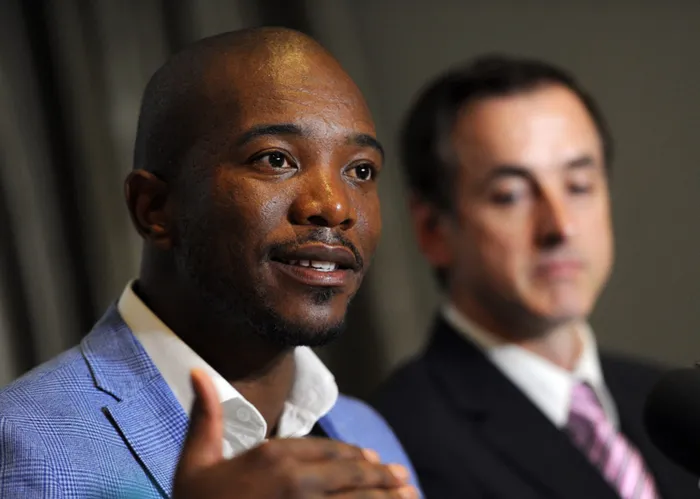No benefit from disrupting Zuma

DA Parliamentary leader Mmusi Maimane and DA Chief Whip Mike Waters DA Parliamentary leader Mmusi Maimane and DA Chief Whip Mike Waters
Cape Town – The DA says it is opposed to any disruption of President Jacob Zuma’s State of the Nation address – it traditionally marks the start of the parliamentary calendar – but instead will take the fight for accountability to the heart of the national legislature.
A portfolio committee on Parliament, to hold Speaker Baleka Mbete accountable as the political head of the National Assembly, and to oversee the parliamentary administration on anything from labour matters to finances, was among the DA’s first order of business in 2015, the party’s chief whip, John Steenhuisen, said on Thursday.
“The proposed committee must be open to the public, so anyone can come and see how their Parliament is functioning,” he said.
This came as DA parliamentary leader, Mmusi Maimane, told reporters any EFF disturbance during the State of the Nation address “may be good for high drama, but it does not help to restore Parliament’s role as the apex of our democracy’s mechanisms of accountability”’.
Instead, Maimane said the DA would work within the rules and demand that the parliamentary programming committee meet before the opening of Parliament and have ready five dates for presidential question slots.
If that did not happen, the DA would reserve its course of action. That Zuma had not answered questions once per term, as parliamentary rules stipulate, remained “a huge problem”, he added.
The EFF unsuccessfully requested a special sitting and earlier this week vowed it would ensure Zuma answered questions at the State of the Nation address about when he would repay money spent on R215 million taxpayer-funded security upgrades at his Nkandla rural homestead, in line with the public protector findings that he had “unduly” benefited.
In her response, Mbete cautioned the EFF that its proposed conduct “potentially constitutes intimidation” under the 2004 Powers, Privileges and Immunities of Parliament and Provincial Legislatures Act.
And the Speaker said the programming committee, which she chairs, was the “appropriate” forum to schedule presidential question time, for which consultations between her office and the presidency were under way.
On Thursday the presidency said a date for the first parliamentary term oral question slot would be finalised “in due course, and will be communicated publicly as part of the president’s programme that is released to the media regularly”.
Parliamentary officials this week said convention dictated that only the president spoke at the State of the Nation address, which outlines the year’s government priorities, policies and programmes.
The rules themselves are silent about what happens if there are questions, or if an MP rises on a point of order, a move which effectively silences the speaker at the podium until the presiding officer decides whether to allow the point of order.
A united front of opposition parties have lambasted the president for ignoring the national legislature – and in the acerbic politicking tempers ran high in a repeatedly chaotic National Assembly.
Zuma’s August 21 question session was abandoned amid the EFF’s “Pay back the money” fracas. The presidency dismissed claims Zuma was failing in his duties.
The DA’s move for Parliament’s own oversight committee comes amid deep unhappiness over rulings during last year’s terse sittings, particularly by Mbete, also the ANC national chairwoman, who once stated “I refuse to recognise anyone”.
The 2004 Guidelines to National Assembly Procedure, among the tools to run Parliament, states: “The Speaker is required to act fairly and impartially and to ensure that the rights of all parties, including minority parties, are protected. In all his or her actions, the Speaker must uphold the dignity and good name of the House”.
On Thursday Maimane said Mbete was “part of the problem” at Parliament: “If you want to have a functioning Parliament, you must have a functioning Speaker”.
Although Parliament’s political oversight authority (POA), effectively an in-house policy and political structure, is meant to keep everyone in the loop, it has sat only once in the post-2014 election Parliament, in late November.
That meeting’s discussions behind closed doors, as is the norm with the POA, failed to decide on one of the four versions of how to handle disruptions, including calling in the police. Thus Parliament does not have an official policy of what to do in such instances.
Steenhuisen said frustration levels were rising over how to, for example, have grievances arising out of presiding officers’ rulings addressed, and also over how decisions are taken on the running of the national legislature, and its administration.
Whether the DA stands any chance remains to be seen. A group of opposition parties has long, but unsuccessfully, called for a parliamentary committee on the presidency .